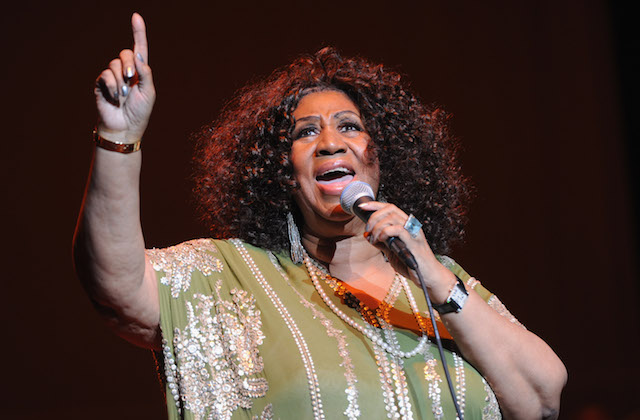How Aretha Franklin Lent Her Voice to the Civil Rights Movement

Following reports of debilitating illness, the family of Aretha Franklin officially confirmed to The Associated Press that the legendary singer died today (August 16) from pancreatic cancer. She was 76.
“In one of the darkest moments of our lives, we are not able to find the appropriate words to express the pain in our heart," the family's statement reads. "We have lost the matriarch and rock of our family. The love she had for her children, grandchildren, nieces, nephews and cousins knew no bounds.”
"Thank you for your compassion and prayers," the statement adds. "We have felt your love for Aretha and it brings us comfort to know that her legacy will live on."
Franklin sang gospel songs as a child at Detroit's New Bethel Baptist Church, where her father served as pastor and organized racial justice actions with other Black activist leaders. It was just the start of a career that spanned more than six decades, as Franklin used her four-octave vocal range to touch hearts. One of her most famous songs ultimately bridged her upbringing with the Civil Rights Movement and related liberation struggles.
The Library of Congress (LOC) notes that Franklin's 1967 version of "Respect" extended beyond the reach of Otis Redding's original 1965 recording and reached the top of the Billboard Hot 100 chart. It excelled at a time when Black organizers as ideologically disparate as the Reverend Dr. Martin Luther King Jr. (who she knew through her father's organizing and eventually toured with) and the Black Panther Party pushed against systemic racism.
The LOC adds that "Respect's" message of basic dignity resonated with many of these activists, as well as women's rights organizers and other social justice-minded Americans. Her connection with Dr. King came full circle a year later, when she sang at the assassinated leader's funeral.
Franklin explored Black struggle and liberation throughout her catalog, especially on her 1972 album, "Young, Gifted and Black." It takes its name from her performance of Nina Simone's affirming anthem of a similar name.
Franklin also carried these politics beyond wax. She told Jet magazine in 1970 that she would post then-jailed activist Angela Davis' bail if necessary. Here's what she said at the time:
Angela Davis must go free. Black people will be free. I've been locked up (for disturbing the peace in Detroit) and I know you got to disturb the peace when you can't get no peace. Jail is hell to be in. I'm going to see her free if there is any justice in our courts, not because I believe in communism, but because she's a Black woman and she wants freedom for Black people.
